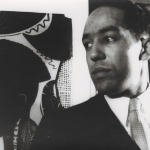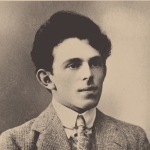One of those appointments you postpone
until anxiety propels you to the phone,
then have to wait too long for, to take
an inconvenient time . . . Late in the day,
an old man and I watch the minute hand
on the waiting room wall. I’ve papers
to grade, but he wants someone to talk to,
and his attendant’s rude, so he turns
his whiskery face to me: “Y’ know, I lived
my whole life in Waltham, worked 40 years
at the watch factory—oh, that city used to be
so beautiful, now it’s a mess, those Cubans
and Puerto Ricans, they ruined it.”
Coiled in his wheelchair, he’s mad
for company, probably scared he’s dying,
*
and so am I. I don’t remember Watch City
as beautiful the year I was eleven,
when Merle and I rode the Grove Street bus
to Moody Street to shoplift haircurlers
and Pond’s Vanishing Cream, nickel items
at the Waltham Woolworth’s. It was
an old factory town, wooden triple-deckers,
Merle and I didn’t risk a furtive life
of crime in our well-kempt Auburndale
where we thought we were well-known,
and canoers paddled the same Charles River
past our homes. And I still wonder
what could have vanished when we rubbed
the mystery elixir on our silky cheeks?
*
His cheeks sucked in, this geezer could be
my grandfather forty years ago, so
I ignore his racist overture and agree
Waltham was beautiful, as the attendant
takes his Social Security card,
and whistles: “Boy, are you old!”
then mutters something else in Spanish.
The number must be low. . . . “1936—
that was the first year of Social Security!”
the old guy brags. The kid forsakes
our ancient history, flexes his muscles.
He’s probably been listening
to insults for an hour in the Elder Van,
he’s bored and angry—why should he be
nice? Yet hungry for a distracting
fact or story, I encourage the grandfather,
I want to be treated well myself some day,
when I’ll need it even more than I do now. . . .
My little bids for attention, my birds, fragile
fluttering words, desire to be visible and seen. . . .
“FDR was okay, wasn’t he?” I’m playing
90, it’s what I do to make us both
less lonely, reminisce as if we’d shared
the ’30s, as if I’d been there, come
from Sicily or Limerick, a seamstress
earning her hard living one town over.
I always sat this way with Doc, years
after he’d retired, his best treasure
(besides my golden mother) a gold
pocket watch, a Handsome Waltham watch—
*
a different time, when the things
a person held or owned weren’t many
but were permanent, a part of who you were.
So his elegant watch confused me toward
the idea my little dentist grandfather
had some connection to the company,
as if he’d labored there, a master craftsman,
had been rewarded by a grateful boss.
His bit of luxury, the swirling monogram
on the back (which opened with a click),
IR, for Isaac Rosenberg, timepiece
connected by a chain to a safety pin
at his frayed striped trouser pocket;
another pin secured his Shawmut bankbook,
deposits he’d made decades before
*
that I’d inherit, $214, Shawmut branch
nearby the long-gone Waldorf Cafeteria
where he idled weekday mornings
with his cronies, also reminiscing,
I suppose (although then I didn’t think
of it), the Good Old Days before
the motorcar, before their children
moved away. Dexterity and skill gone, too,
from his arthritic hands. He relished
those mornings! The black-and-white
tiled floor, the nearly empty tables,
the Perfection Salad, Welsh rarebit,
the “bloomberry pie.” The counterman.
They serve an elegant porridge there,
he told me, gourmet of the ordinary,
State-of-Maine-ah grandfather, my Mainiac.
The soon-to-be-widowed wives elsewhere,
polishing mahogany veneer, or playing
bridge, or shopping Coolidge Corner
from butcher to baker in prescient
black dresses. Old men and women
so relieved to be rid of the burden
of one another for a whole morning,
of the tired bickering sentences
of long American marriages, of pain
and disappointment. What memories
they’d had of courtships long since passed on
to grandchildren, and half-false anyway,
like studio photographs, mythic stories
they could live with; now forgotten,
the mistakes they’d been too fearful
or devout to rectify. I miss that
cafeteria, the whole idea of cafeterias,
although Doc never took me, just pointed
to it on our Sunday drive, repeating
paeans to gray porridge, something no
description’s glow could make me want.
Waltham had them, too, free-fire zones
a kid alone could enter with five cents
for huge iced cookies, black-and-whites,
*
half chocolate, half vanilla, all Crisco
and white sugar, chewed in gluttonous
companionable half-light, wonderful—
But who’d know that now? Who cares?
Merle and I did everything subversive
we could imagine—which wasn’t much.
I’m sure I cruised Sin City in my mind,
decayed old town—nowhere—but to me
forbidden fruit: the 5 & 10, eyelash
curlers, odd metal torture instruments
I smuggled home that pinched my lids
and made my lashes angle wildly up,
delinquent startled in the bathroom
mirror; Tangee lipsticks the size
of my little finger, unflattering coral;
pink girdles I’d eye furtively, wondering
that I’d have to wriggle into one someday,
or wear the bony corset my grandmother
assured me was my fate. Oh, esoteric glamorous
puzzle of the vanished vanishing cream . . .
*
Later, not so much later, the first day
of my driver’s license, I drove the family
station wagon down Moody Street and banged
the traffic policeman’s rubber perch.
He jumped down before it bounced the street,
and yelled me over in a rage. Or maybe,
he was kindly, it’s only my criminal terror
I remember, of punishment fine-tuned,
my ruined life, my new rights vanishing.
Hardly a threat, I know now, the feckless cop.
I gripped the steering wheel so hard
to stop the huge recalcitrant Ford, doomed
to lose my brand-new temporary license—
How could I think, my budding power stripped,
I’d ever get the chance to live or drive?




















Comment form: